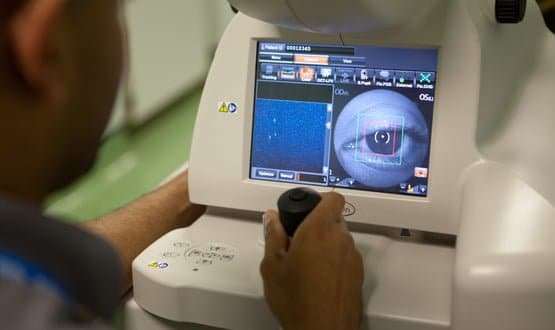DeepMind AI system ‘able to identify eye diseases and make referrals’
- 14 August 2018

Researchers claim to have trained a machine learning system to identify eye diseases from scans and to recommend appropriate referrals.
The team’s paper, published online on Monday by medical journal Nature Medicine, reports the technology was able to make the right referral recommendations more than 94% of the time.
The artificial intelligence (AI) system was developed by researchers from Moorfields Eye Hospital NHS Foundation Trust, DeepMind and University College London (UCL). It is designed to identify 10 features of eye diseases from optical coherence tomography (OCT) scans, and recommend an appropriate referral.
To ensure the AI system was making the correct referrals, clinicians viewed the same OCT scans and made their own decisions – against which the AI’s recommendations were compared.
The AI system can also provide information to help explain how it arrives at its recommendations. This would allow clinicians to scrutinise them and check accuracy before deciding on the type of treatment a patient receives.
The research team, which began its study in 2016, has claimed the system can be applied to different types of eye scans – not just the one on which it was trained. Researchers contend this could “significantly increase” the number of people who could benefit from it.
Pearse Keane, consultant ophthalmologist at Moorfields Eye Hospital NHS Foundation Trust and National Institute for Health Research (NIHR) clinician scientist at the UCL Institute of Ophthalmology said: “The AI technology we’re developing is designed to prioritise patients who need to be seen and treated urgently by a doctor or eye care professional.
“If we can diagnose and treat eye conditions early, it gives us the best chance of saving people’s sight. With further research it could lead to greater consistency and quality of care for patients with eye problems in the future.”
Clinical trials will be needed, as well as regulatory approval, before the technology can be used more widely.
If the trials prove successful, and approval is gained, Moorfields will be able to use the product for free across all 30 of their UK hospitals and community clinics for an initial period of five years.
Mustafa Suleyman, co-founder and head of applied AI at DeepMind Health, said the results were “exciting”.
He added: “[The results] take us one step closer to that goal and could, in time, transform the diagnosis, treatment and management of patients with sight threatening eye conditions, not just at Moorfields, but around the world.”
Matt Hancock, health and social care secretary, called the research “hugely exciting” and said the technology could be “genuinely transformative for the NHS in the future”.



